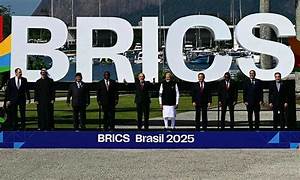
BRICS Nations Decry and Oppose EU’s Carbon Border Tax on Imports

 :
| Updated On: 08-Jul-2025 @ 3:36 pm
:
| Updated On: 08-Jul-2025 @ 3:36 pmSHARE
In their strongest stance yet on climate-related trade policies, the BRICS nations—comprising major developing economies—have condemned and rejected the European Union’s Carbon Border Adjustment Mechanism (CBAM) and similar unilateral trade restrictions imposed under the pretext of environmental concerns. The group denounced such measures as punitive, discriminatory, and protectionist tools that violate international laws and undermine the development goals and clean energy transition efforts of emerging economies.
CBAM is an import tariff the EU levies on goods manufactured through carbon-intensive processes outside Europe. While the EU justifies it as a measure to prevent “carbon leakage,” it effectively raises costs on imports—such as steel and cement—from developing nations like India, making their products less competitive in European markets. The BRICS members, including India, China, Brazil, Russia, and South Africa, assert that CBAM violates international trade and climate agreements and impedes developing nations from achieving sustainable development.
During the BRICS annual summit held in Brazil, the member nations issued a climate finance declaration expressing strong opposition to unilateral measures like CBAM and restrictions on forest goods trade. These actions, they said, conflict with the 1994 UN Framework Convention on Climate Change (UNFCCC), which promotes inclusive and non-discriminatory global economic practices. Specifically, Article 3(5) of the UNFCCC urges countries to avoid using climate measures as trade barriers or tools of arbitrary discrimination.
The BRICS declaration warned that such unilateral measures not only distort global trade and supply chains but also hinder their capacity to invest in just energy transitions and national development goals. These restrictions may lead to the diversion of essential resources at a time when developing nations face significant financial shortfalls for climate action and sustainable growth.
The group emphasized the critical need for non-discriminatory access to international trade and climate finance. They urged developed countries to honor their UNFCCC and Paris Agreement commitments, particularly the provision of financial resources to support developing nations’ climate actions. Developed countries had pledged to mobilize at least $100 billion annually, increasing to $300 billion from 2035, yet developing countries argue that these targets fall short. Current needs exceed $1.3 trillion annually, they said.
Furthermore, the BRICS countries highlighted that developing nations, despite contributing less to climate change, bear the brunt of its impacts and lack infrastructure and resources to mitigate the damage. They called for a greater focus on adaptation finance, stressing that such support must be primarily grant-based, concessional, and accessible to local communities. The funding should not worsen the debt burdens of developing economies, they insisted.
The group urged that by 2025, adaptation funding should be doubled compared to 2019 levels, as agreed in previous climate negotiations. They emphasized that climate finance must be predictable, adequate, and directly accessible, and aligned with national adaptation priorities.
In summary, the BRICS nations strongly opposed CBAM and similar measures, demanded fair climate financing from the developed world, and advocated for global economic equity and adherence to international climate agreements.